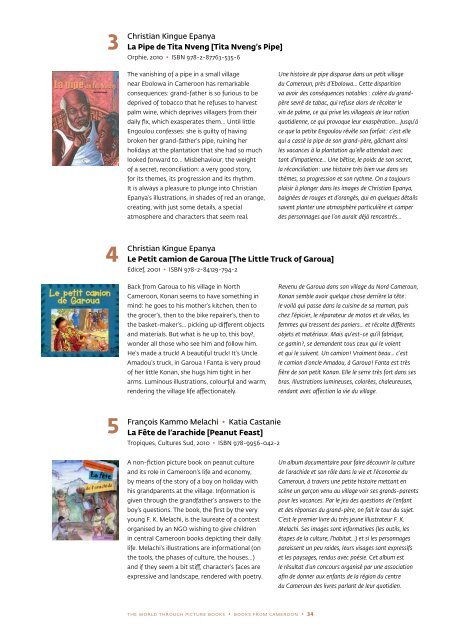world_pictures
world_pictures
world_pictures
You also want an ePaper? Increase the reach of your titles
YUMPU automatically turns print PDFs into web optimized ePapers that Google loves.
3<br />
Christian Kingue Epanya<br />
La Pipe de Tita Nveng [Tita Nveng’s Pipe]<br />
Orphie, 2010 • ISBN 978-2-87763-535-6<br />
The vanishing of a pipe in a small village<br />
near Ebolowa in Cameroon has remarkable<br />
consequences: grand-father is so furious to be<br />
deprived of tobacco that he refuses to harvest<br />
palm wine, which deprives villagers from their<br />
daily fix, which exasperates them… Until little<br />
Engoulou confesses: she is guilty of having<br />
broken her grand-father’s pipe, ruining her<br />
holidays at the plantation that she had so much<br />
looked forward to… Misbehaviour, the weight<br />
of a secret, reconciliation: a very good story,<br />
for its themes, its progression and its rhythm.<br />
It is always a pleasure to plunge into Christian<br />
Epanya’s illustrations, in shades of red an orange,<br />
creating, with just some details, a special<br />
atmosphere and characters that seem real.<br />
Une histoire de pipe disparue dans un petit village<br />
du Cameroun, près d’Ebolowa… Cette disparition<br />
va avoir des conséquences notables : colère du grandpère<br />
sevré de tabac, qui refuse alors de récolter le<br />
vin de palme, ce qui prive les villageois de leur ration<br />
quotidienne, ce qui provoque leur exaspération… Jusqu’à<br />
ce que la petite Engoulou révèle son forfait : c’est elle<br />
qui a cassé la pipe de son grand-père, gâchant ainsi<br />
les vacances à la plantation qu’elle attendait avec<br />
tant d’impatience… Une bêtise, le poids de son secret,<br />
la réconciliation : une histoire très bien vue dans ses<br />
thèmes, sa progression et son rythme. On a toujours<br />
plaisir à plonger dans les images de Christian Epanya,<br />
baignées de rouges et d’orangés, qui en quelques détails<br />
savent planter une atmosphère particulière et camper<br />
des personnages que l’on aurait déjà rencontrés…<br />
4<br />
Christian Kingue Epanya<br />
Le Petit camion de Garoua [The Little Truck of Garoua]<br />
Edicef, 2001 • ISBN 978-2-84129-794-2<br />
Back from Garoua to his village in North<br />
Cameroon, Konan seems to have something in<br />
mind: he goes to his mother’s kitchen, then to<br />
the grocer’s, then to the bike repairer’s, then to<br />
the basket-maker’s… picking up different objects<br />
and materials. But what is he up to, this boy?,<br />
wonder all those who see him and follow him.<br />
He’s made a truck! A beautiful truck! It’s Uncle<br />
Amadou’s truck, in Garoua ! Fanta is very proud<br />
of her little Konan, she hugs him tight in her<br />
arms. Luminous illustrations, colourful and warm,<br />
rendering the village life affectionately.<br />
Revenu de Garoua dans son village du Nord Cameroun,<br />
Konan semble avoir quelque chose derrière la tête :<br />
le voilà qui passe dans la cuisine de sa maman, puis<br />
chez l’épicier, le réparateur de motos et de vélos, les<br />
femmes qui tressent des paniers... et récolte différents<br />
objets et matériaux. Mais qu’est-ce qu’il fabrique,<br />
ce gamin ?, se demandent tous ceux qui le voient<br />
et qui le suivent. Un camion ! Vraiment beau... c’est<br />
le camion d’oncle Amadou, à Garoua ! Fanta est très<br />
fière de son petit Konan. Elle le serre très fort dans ses<br />
bras. Illustrations lumineuses, colorées, chaleureuses,<br />
rendant avec affection la vie du village.<br />
5<br />
François Kammo Melachi • Katia Castanie<br />
La Fête de l’arachide [Peanut Feast]<br />
Tropiques, Cultures Sud, 2010 • ISBN 978-9956-042-2<br />
A non-fiction picture book on peanut culture<br />
and its role in Cameroon’s life and economy,<br />
by means of the story of a boy on holiday with<br />
his grandparents at the village. Information is<br />
given through the grandfather’s answers to the<br />
boy’s questions. The book, the first by the very<br />
young F. K. Melachi, is the laureate of a contest<br />
organised by an NGO wishing to give children<br />
in central Cameroon books depicting their daily<br />
life. Melachi’s illustrations are informational (on<br />
the tools, the phases of culture, the houses…)<br />
and if they seem a bit stiff, character’s faces are<br />
expressive and landscape, rendered with poetry.<br />
Un album documentaire pour faire découvrir la culture<br />
de l’arachide et son rôle dans la vie et l’économie du<br />
Cameroun, à travers une petite histoire mettant en<br />
scène un garçon venu au village voir ses grands-parents<br />
pour les vacances. Par le jeu des questions de l’enfant<br />
et des réponses du grand-père, on fait le tour du sujet.<br />
C’est le premier livre du très jeune illustrateur F. K.<br />
Melachi. Ses images sont informatives (les outils, les<br />
étapes de la culture, l’habitat…) et si les personnages<br />
paraissent un peu raides, leurs visages sont expressifs<br />
et les paysages, rendus avec poésie. Cet album est<br />
le résultat d’un concours organisé par une association<br />
afin de donner aux enfants de la région du centre<br />
du Cameroun des livres parlant de leur quotidien.<br />
the <strong>world</strong> through picture books • books from cameroon • 34


